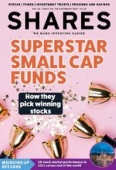Archived article
Please note that tax, investment, pension and ISA rules can change and the information and any views contained in this article may now be inaccurate.
Stock markets stage full recovery after Omicron fears

Stock markets hate uncertainty, and the arrival of Omicron has created an information vacuum which is likely to persist until scientists and economists get to grips with the likely health and economic effects caused by the latest variant of concern.
On 26 November, the so-called fear gauge, the VIX index, spiked higher as investors scrambled to hedge their portfolios, sending US markets down by around 2%.
UK and European markets dropped by more than 3% with travel related shares and economically sensitive stocks, such as banks, taking the brunt of the fall.
British Airways owner International Consolidated Airlines (IAG) dropped by as much as 20% and Lloyds (LLOY) dropped by close to 10%.
Commodities like oil and copper sank as markets moved to price in lower global growth, while interest rates dropped.
Comments from Moderna chief Stephane Bancel prompted another sell-off in markets on 1 December after he predicted a ‘material’ drop in effectiveness from current vaccines against the new variant.
Fed chairman Jay Powell added to uncertainty on the same day after he surprised markets by saying the US central bank would discuss an increase in tapering (removing stimulus) at the December meeting, which sent bond yields higher and prices lower.
Elevated volatility saw the VIX index climb from 18.58 on 24 November to 31.12 on 1 December. Historically, large spikes in the VIX index have been associated with ‘market capitulation’ and higher future stock prices.
Sentiment already appears to be shifting. The VIX has since dropped back to 22.02 and at the time of writing (7 Dec), the FTSE 100 index had recovered all its losses since the variant first dominated the headlines, and was trading slightly above pre-Omicron levels.
The index has been helped by a strong rebound in index heavyweights Royal Dutch Shell (RDSB) and BP (BP.).
After falling as much as 15% on Omicron worries oil prices have staged a recovery rally following a meeting of oil producers’ cartel Opec+ (Dec 2) where Saudi Arabia and its allies agreed to press ahead with efforts to increase production by 400,000 barrels a day each month.
Opec+ also hinted it would adjust production if necessary, which seems to have provided support to prices. Brent Crude has risen by around 8% to $71.70 per barrel since the meeting.
Before the Opec+ meeting several countries including the US, China and the UK had indicated they would release supplies from their strategic oil reserves to help curb prices.
Important information:
These articles are provided by Shares magazine which is published by AJ Bell Media, a part of AJ Bell. Shares is not written by AJ Bell.
Shares is provided for your general information and use and is not a personal recommendation to invest. It is not intended to be relied upon by you in making or not making any investment decisions. The investments referred to in these articles will not be suitable for all investors. If in doubt please seek appropriate independent financial advice.
Investors acting on the information in these articles do so at their own risk and AJ Bell Media and its staff do not accept liability for losses suffered by investors as a result of their investment decisions.
Issue contents
Danni Hewson
Editor's View
Feature
Great Ideas
Investment Trusts
News
- BT could go down a different path for its sports arm
- China crackdown on US listings to benefit Hong Kong Stock Exchange
- Stock markets stage full recovery after Omicron fears
- Thungela plots bumper dividend despite coal price retreat
- Stocks relevant to efforts to licence vaping for medical use
- New listing rules aim to bring more innovative companies to London
 magazine
magazine









